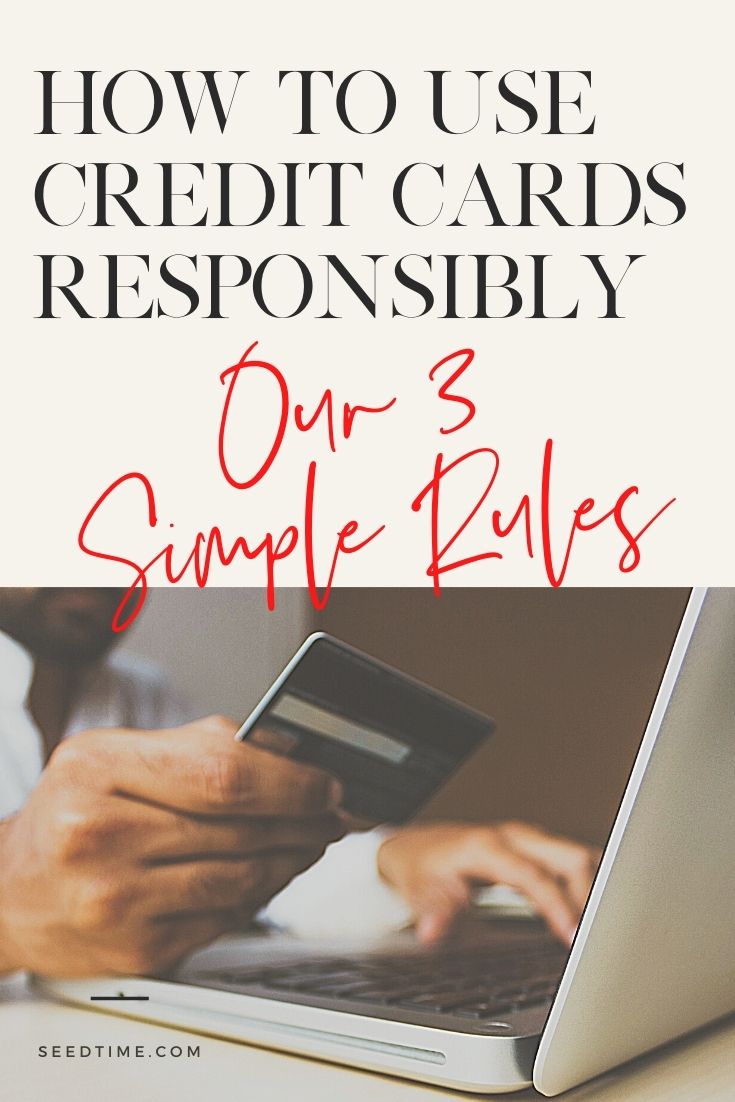When I was in my early 20’s I had no idea how to properly use a credit card – and I definitely didn’t know how to use it responsibly.

And as a result my financial life was a mess.
Sure, I could blame Visa and Mastercard, but the truth was that it was my fault.
They provided me access to a tool, but I didn’t use the tool properly and got harmed by it.
Out of that mess, Linda and I created 3 rules for credit card use that have helped us be responsible with our credit cards and have served us well.
These 3 simple rules ensured that we would use our credit cards wisely and as a result never be hurt by credit cards again, all while using the tool to our advantage in a big way.
Since we created our 3 credit card rules we:
- haven’t paid a dime of interest to the credit card companies.
- never blow our budget with a credit card.
- haven’t had money fights over our credit card spending.
- have gotten many thousands of dollars worth of rewards.
Our 3 simple rules to use credit cards responsibly
I tend to think of a Credit Card like a chainsaw.
A chainsaw is a relatively dangerous power tool that hurts a fair number of people each year. But when I have had to chop up a big tree, I used it responsibly and it provides a lot of benefit.

Like most tools, we can use them for our benefit or harm if we aren’t careful.
Would I loan out my chainsaw to just anyone, not knowing if they could use it responsibly? Not at all.
The same should be said about credit cards. And by following the 3 rules I’ve used, you will be better prepared to use it responsibly, should you choose to use one.
How our family uses credit and debit cards
Because we use the Real Money Method as our alternative to traditional budgeting, we use a debit card for most of our day-to-day expenses. But we also responsibly use a credit card each month as well.
We are 100% debt free (including having paid off our mortgage) at this point in our lives and I never want to pay a dime of interest for the rest of my life.
As such, here are the 3 rules I’ve developed over the years to help us use them responsibly, not overspend on them, while also getting some of the benefits they offer.
Rule 1: Don’t use credit cards for discretionary expenses
Odds are good that when compared to using cash, you will spend more with a credit card. The trick to prevent this is by creating systems to ensure that you don’t. With rare exceptions, we don’t use our credit cards for discretionary categories in our budgets – only expenses that don’t lead to any temptation to spend more.
For example: we don’t buy groceries or use it for personal spending. The reason? Because there is a temptation to spend more at the grocery store or on those new pair of Nikes that I want.
But what we do instead is use them on the cell phone bill, insurance bills, or giving to our church. The reason? There isn’t much temptation to overspend on each of these. And that is the key.
If I can eliminate the temptation to spend more on my credit card, it makes it soooo much easier to use it wisely and responsibly.
Rule 2: Don’t ever carry a balance
There is a rule among the self-defense crowd that the best way to win a fight is to avoid it at all costs.
So if using a credit card without carrying a balance is a struggle, then just run and avoid the fight altogether. Use a debit card. Take the credit card out of your wallet and freeze it in a block of ice. If it still is a temptation, drop it in the shredder!
When Linda and I first got married this was us. We couldn’t control our spending. So we closed them down and lived successfully without one for probably 7 years. Once we were in a much more solid financial footing (and had matured a bit) we opened up a great rewards card.
We made a pact that if we ever couldn’t pay the balance in full, even one time, we would close it down.
Rule 3: Make sure you’re using a good credit card
Most people don’t understand how much of a gaping divide there is between an average “rewards” credit card rewards program and a good one. It’s not like 2x better, it’s more like 10-50x better.
It is the difference of using your card all year and getting $50 in rewards vs $1,600 in travel rewards.
So, please, if you are going to use one, don’t just use it because someone gave you a t-shirt to sign up.
Do your homework and find a good credit card.
When I look for a credit card, here are some points I consider:
- Annual fee: All things being equal I would prefer $0, but some provide such great rewards that a $99 annual fee might be worth it.
- Balance transfer fee: This is how much you have to pay to transfer the balance from one card to another. Let”s say you have a card with a $5,000 balance that is charging you 24% APR. You find another card that has a promotional offer of 0% on balance transfers for 12 months, it might make sense to pay a 3% balance transfer fee ($5k x 3% = $150) to have a 0% interest rate for 12 months.
- APR: This is your interest rate. In general lower is better, but if you follow our never-carry-a-balance rule, it will never matter because you won’t be carrying a balance. Additionally, some cards offer a lower intro APR (i.e. 0% for 12 months) for new purchases and occasionally for balance transfers as well.
- Earning Rate: This is the rate at which you earn rewards. One point per $1 spent is pretty common. The value of points varies quite a bit, but, in general, more is better.
- Signup Bonus: Many cards offer signup bonuses (typically 20k-50k points). They typically have spending requirements (i.e. spend $4,000 on the card within 3 months) in order to get the bonus. We had an entire 10-day hotel stay covered by a single bonus, so there is a lot of potential here.
My current top credit card recommendation
It”s easy to get overwhelmed by all the different credit card options, so I’ll just tell you my current top pick:
The Chase Sapphire Preferred
I hang around with a lot of personal finance nerds who do this stuff for a living, and this is the card they pull out more than any other.
There is a good reason for that – it is simply a fantastic card.
This was the primary card Linda and I used to get over 100 hotel nights and flights for free.
- You can use the points for travel (they go a long way if you do what I suggest in this article)
- You can get cash back
- Or you can even use points on experiences like booking a flight in an actual fighter jet (no joke – and 200k points if you’re curious)
100,000 signup bonus
This card does have a $95 annual fee, but they are currently offering an unheard of 100,000 point signup bonus – which is worth $1,000 if you take the cash back option, or even more if you use it for travel.
The only thing you need to do to get the bonus is spend $4,000 on the card in the first 3 months. If you have good credit and are looking for a fantastic card, the Chase Sapphire Preferred is always at the top of my list.
You can learn more about it and apply here if you’re interested.
Those are my 3 rules for responsible credit card use
If you can’t follow them – especially number 2, then I would just skip them altogether and just use a debit card.
While credit cards certainly have their benefits, if you are carrying a balance (and paying interest each month) you are negating all those benefits.
If you are currently working to pay off large credit card balances you’ve accumulated, do whatever you can to NOT add to them.
If you are sitting in a canoe with a few holes in it, you will find it to be a lot easier to scoop out the water after the holes are plugged – right?
So, if that is you, focus on plugging the holes, and then start scooping out the water.




